The ultimate goal of every link builder is to build a strong backlink profile. This is where high-quality backlinks and referring domains come in. For example, a website that has 1000 links from 10 sources is not as strong as a website that has 1000 links from 1000 different websites. The latter website has more trust, more prominence, and more relevance in the eyes of Google.
Do you want your digital marketing campaign to skyrocket, but you’re as busy as a bee? We know how to boost your site’s performance by spending only 90 seconds on each website to identify good prospects for your link building purposes.
Whether you are a professional link builder, an SEO specialist, or a business owner who wants to promote a site, evaluating link building prospects should be your main priority. Fortunately, you can discover the websites to obtain high-quality backlinks in less than two minutes if you use the right tools and follow a time-tested approach. And today is your lucky day because we’ll share our proven link building formula with you!
The Link Building Challenge
Link building is undoubtedly one of the most important SEO strategy elements. The more high-quality references from popular online resources your website gets, the more reputable it is in the eyes of search engine algorithms and average users. Furthermore, an efficient link building campaign can help you achieve the following goals:
- Increase your rankings;
- Establish professional relationships with industry leaders;
- Boost organic traffic flow;
- Enhance your online visibility.
If you’ve just entered the world of SEO, you probably think that getting links from other websites is as easy as learning ABC. However, the hard truth is that this process requires extensive experience, advanced knowledge, and powerful tools. You should be ready to face a variety of challenges, including:
- Time-consuming identification of the potential link opportunities;
- Reaching the webmasters without getting flagged as a spammer;
- Dealing with possible rejections from the website owners.
In case you don’t know how to identify and analyze valuable link building opportunities, you’re likely to spend your time and resources without getting the desired results. Moreover, you may even obtain backlinks that will lower your rankings and ruin all your SEO achievements.
Also, if you spend too much time researching link building opportunities without acting, there is a stronger chance that your competitors will identify and secure them first. This puts you at risk of missing out on valuable backlinks. Luckily, you can prevent such an unpleasant situation with our efficient formula.
The 90-Second Link Building Prospect Evaluation Formula
“Give me six hours to chop down a tree, and I’ll spend the first four sharpening the ax.” — no doubt, Abraham Lincoln surely won’t give you bad advice! And in link building, sharpening the ax means thoroughly analyzing your competitors and preparing a winning strategy before diving in.
Find out what link building prospects they use and analyze their metrics. Following this approach, you can prepare the list of requirements and the results you may expect. In addition, it’ll help you figure out how you can improve the methods used by your competitors to overcome them in search engine results pages (SERPs).
It is a good idea to opt for the Competitive Analysis in Ahrefs. Using this convenient tool, you’ll swiftly discover the link building prospects that other websites in your niche use. 
Ahrefs Competitive Analysis will help you see the bigger picture and even provide you with valuable insights. Such an activity allows you to:
- Realistically estimate your chances to outperform your competitors;
- Define the strong sides of their link building tactics;
- Avoid the mistakes of other websites;
- Discover and prioritize the primary ways to grow your backlink profile.
When you collect all the necessary data, check the major metrics of these prospects. Use this information to come up with the criteria you’ll use for your link building strategy.
But don’t hurry to close the Ahrefs tab! Its simplicity and the variety of metrics make this platform popular with SEO specialists and average website owners. Considering this fact, we’ll use this tool for further work so a bigger number of users can implement our 90-second formula without special knowledge.
However, before you start reviewing the websites in Ahrefs, it’ll be a great idea to opt for Batch Analysis. We recommend using this feature on LinkCheker.Pro, as it provides a wide range of metrics essential for the precise estimation of the site’s quality. Thus, you can quickly organize your link building prospects and eliminate low-quality ones, so you don’t have to spend your time analyzing them in Ahrefs. 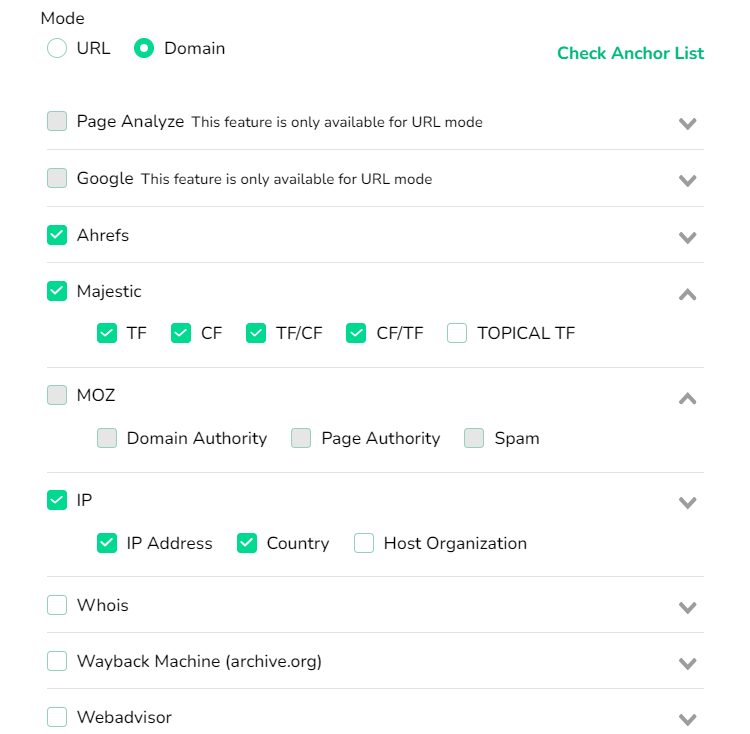
As soon as you finish performing Batch Analysis, you’re ready to implement our 90-second formula! A minute and a half is just enough time to define the value of a website via Ahrefs and decide whether you’ll get any value from obtaining backlinks from it.
Topical Relevance and Main Page (8 seconds)
So, start the 90-second sprint by looking at a website to find out whether it’s related to your niche. It should be topically relevant or, at least, have a category close to your business industry. Also, don’t pass by the sites from adjacent niches.
After confirming the topical relevance, the next step is to ensure that your prospects are suitable for a white-hat niche. Check that the chosen sites don’t have links to gray niches in their home pages’s footers, headers, and sidebars; e.g. the footer of one of the websites that accept guest posts: 
Finally, swiftly scan through the articles published on their main pages. If a lot of them are about online casinos, it’s better to look for other options.
DR (2 seconds)
Domain Rating is an Ahrefs metric that estimates the strengths of a website’s backlink profile compared to other sites in its database. All in all, the rating ranges from 0 to a maximum of 100 points. Unfortunately, webmasters can easily manipulate this metric, significantly increasing the scores. Thus, you should consider other factors before making your final decision regarding a particular link prospect.
Nonetheless, it is generally advisable to choose websites with a Domain Rating of at least 30-40 points. You still may opt for the link building prospects with lower DRs if they’re topically relevant and meet your other criteria. 
Organic Traffic (10 seconds)
This essential metric shows how many people click on the website after discovering it on Google. It usually indicates the efficiency of the site’s SEO methods and content relevance. Here are some factors you should consider while estimating the website’s organic traffic:
- Volume. This number shouldn’t be less than the minimum metrics you’ve established during your competitor analysis.
- Dynamics. The dynamics of organic traffic should be stable or steadily growing during the last six months. Moreover, you may go further and analyze its performance for the previous two years. Plus, consider that there are some traffic trends for particular types of websites. For instance, here we have quite a characteristic dynamics for a local news site:
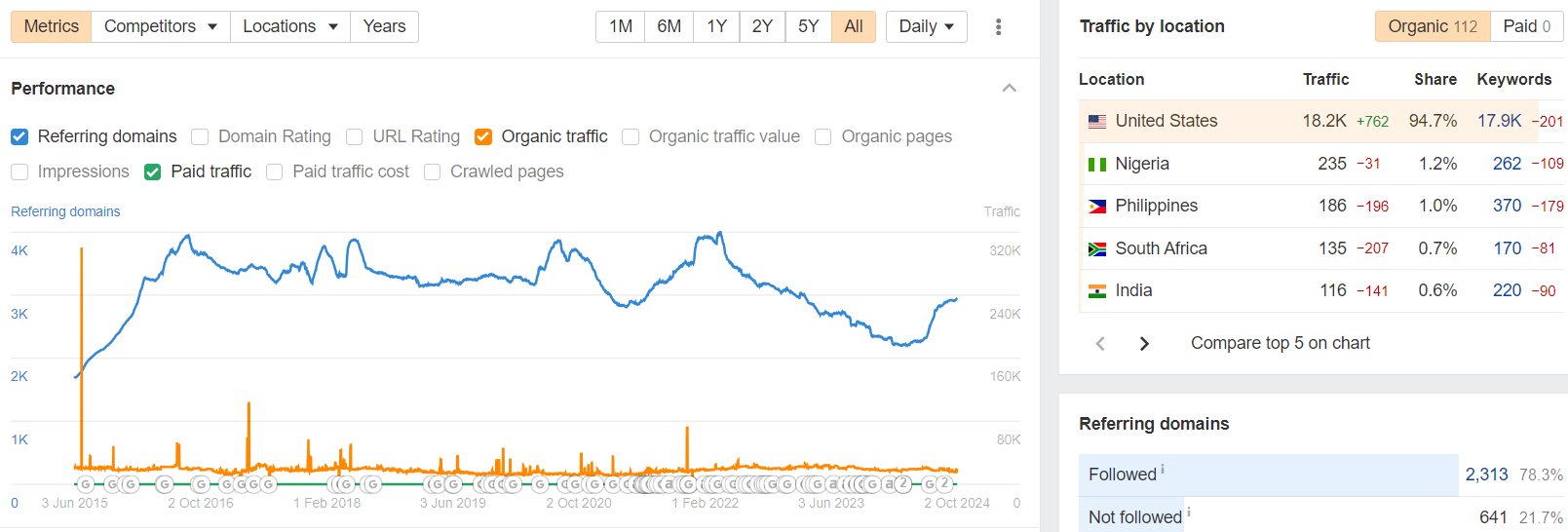
And here you can see a great example of an organically growing technology-related website: 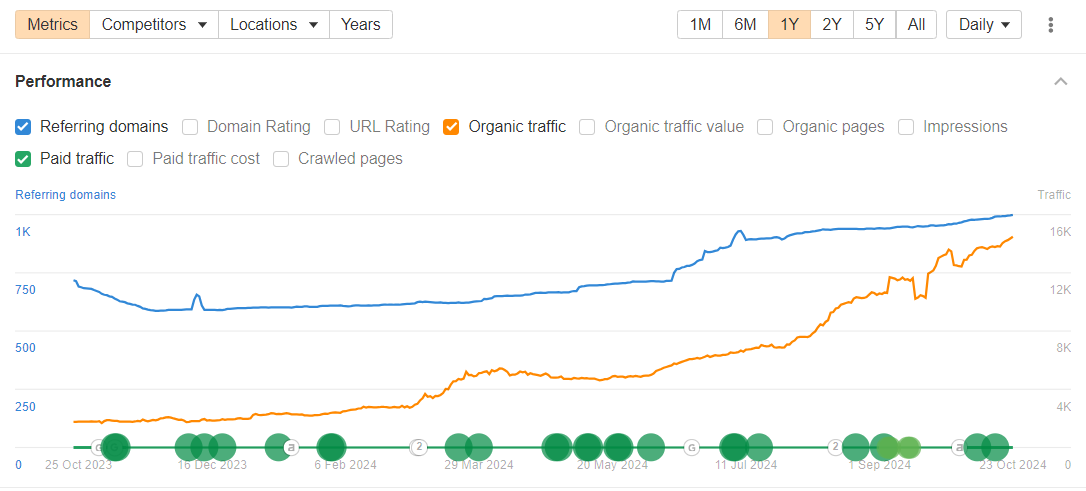
- Value. It’s difficult to come up with a perfect ratio between organic traffic and its value. However, we strongly recommend opting for websites with a traffic value of at least $1,000. If you target your website toward highly developed countries, there shouldn’t be a significant gap between the traffic and its value. For comparison, you also can analyze the niche in your target area to define the minimal traffic value metric you can use while choosing link building prospects.
If this website with these metrics had Traffic Value less than $1000, it would be low-quality website trying to manipulate and mislead users: 
- Relevance. Ensure that the website you choose has high-quality traffic. Have a quick look at its top keywords to define whether the users are driven to the site by relevant search queries. Some sites may manipulate popular keywords to drive low-quality traffic to their websites and appear more attractive for guest posting.
For example, in the screenshot below, you can see a website from the beauty industry that uses irrelevant keywords, such as “How long do monkeys live” and “Do crocodiles die of old age.” Of course, they have nothing in common with the site’s niche and target audience. As a rule, fraudulent web admins often employ this practice to make their sites seem more valuable than they are. 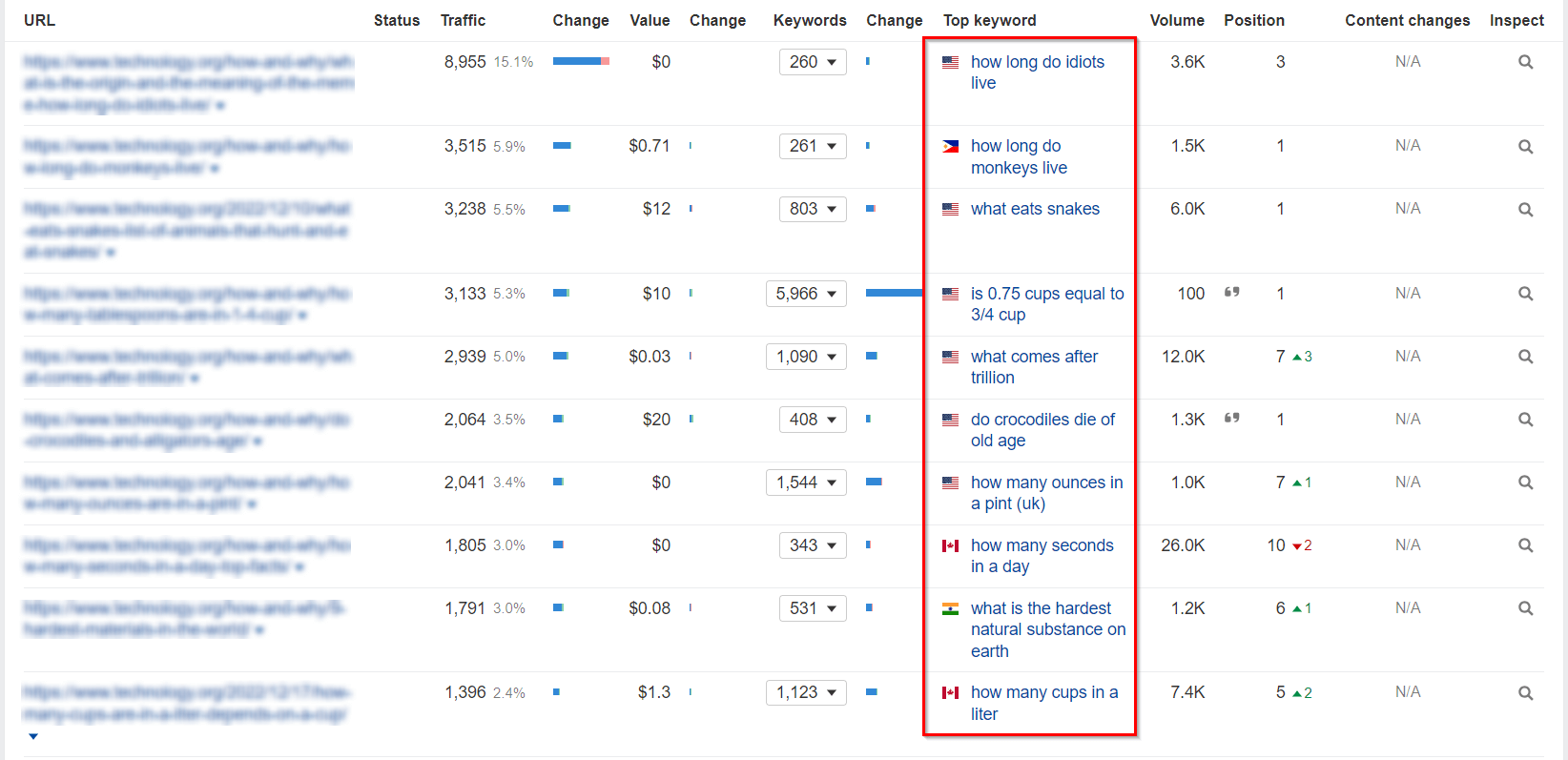
- Country distribution. Always check the percentage of the website’s traffic from top countries to ensure the website meets the minimal requirements you’ve established. Obviously, if your business operates in Australia, getting the backlinks from the website, which mainly gets traffic from the UK and US, and doesn’t have traffic from Australia, is a doubtful decision.
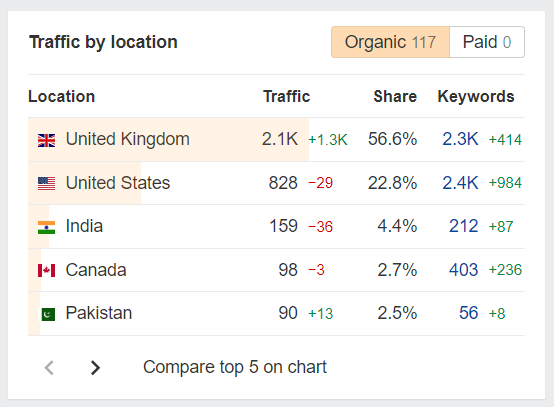
It may happen that your country is third in the Top 3 locations that drive the traffic to your link building prospect. If the website is topically relevant and has great metrics, it still may be a wise decision to get some backlinks from it.
Referring Domains (45 seconds)
Referring domains (RDs) are the websites from which the target site has the backlinks. Well-established online resources may have 100-500 referring domains. When it comes to popular high-authority websites such as Forbes and the New York Times, this number may increase to thousands.
You can perform an initial review of referring domains in about 20 seconds. Follow these valuable tips to estimate this metric ASAP:
- Pay attention to the DR. If a site has thousands of referring domains, but its Domain Rating is still 30, it’s almost 100% that there are a lot of spammy links. In this case, it’s better to spend some more time analyzing the referring domains of this website more precisely.
- Check the ratio between referring domains (RD) and linked domains (LD). Ideally, there should be more RDs than LDs. On the contrary, there is a strong chance that the website was created only to sell links. Getting the backlinks from such an online resource won’t bring you any value and can affect your rankings.
- Analyze referring domains’ quality. Finally, you may notice that most of the website’s RDs are low-quality or have a lot of domains where everyone can get a link for free. It means that they have extremely low daily visits and lack credible backlinks. In this case, it’s better to ignore such a website and look for other link building opportunities.
Top Pages (10 seconds)
Now, it’s time for a swift analysis of the chosen link building prospects’ top pages. It’ll help you to discover which pages on a target site get the most organic traffic. There are some criteria you should consider while estimating this aspect:
- Most of the traffic should be divided into at least 3-5 pages.
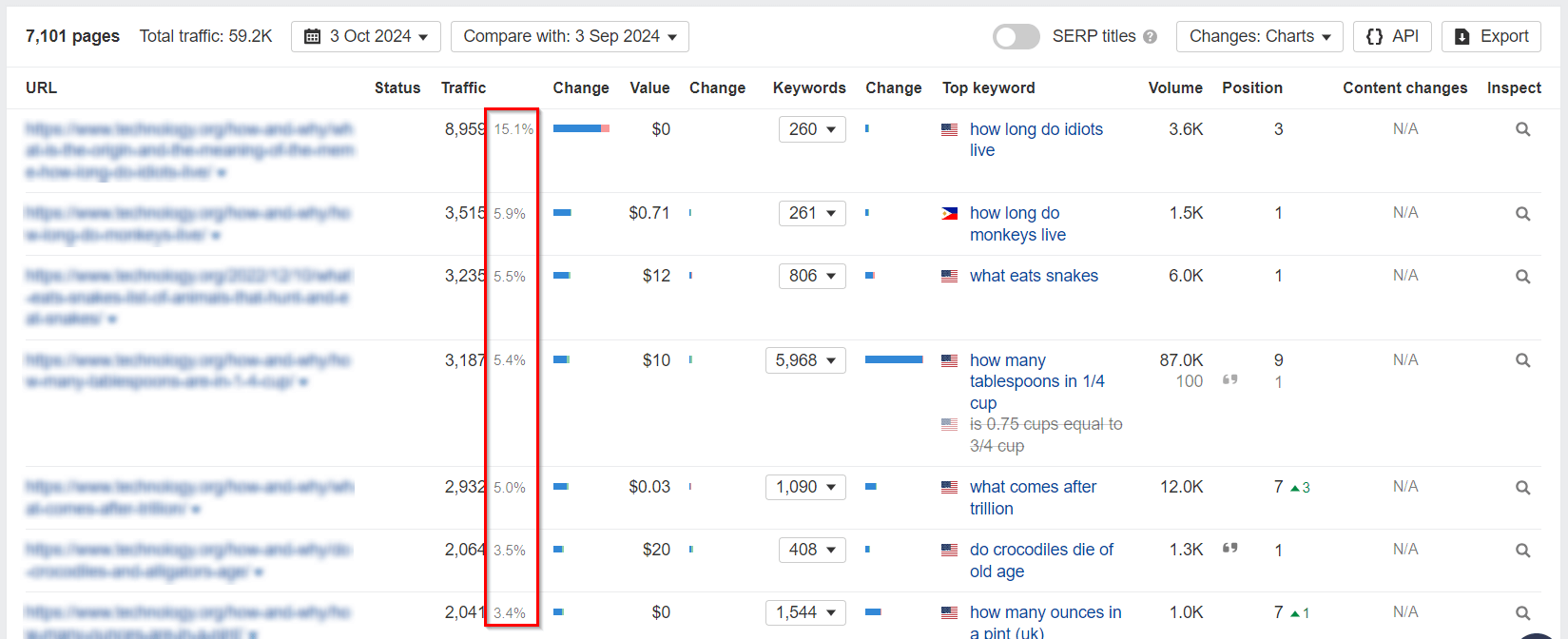
If there is only one page that drives traffic and one day it disappears, the website’s rankings and number of visitors will significantly decrease. Thus, the backlinks you’ve got from such a site will become less valuable.
- Check at least the first 10-15 keywords to make sure the website doesn’t have pages related to porn, gambling, Onlyfans, and other grey niches:
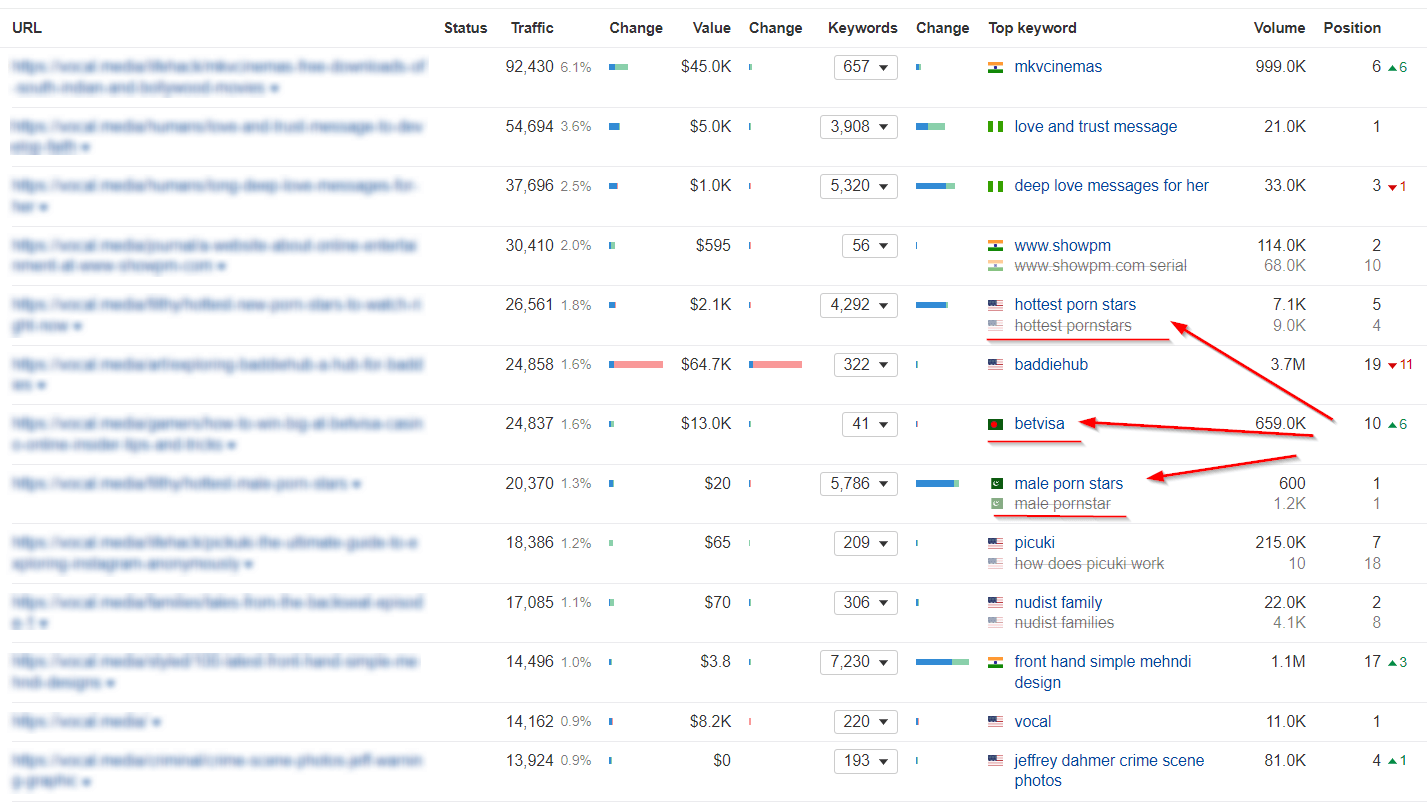
Anchor list (15 seconds)
You’ve almost finished your link building website analysis sprint! Last but not least, you should look at the anchor texts of your link building prospects. Anchors are clickable texts of HTML hyperlinks. They don’t simply connect two websites but also explain the content of the linked page to both search algorithms and internet users.
The bad news is that sometimes websites use spammy link building tactics. For instance, they may use similar words and patterns in their anchors. The chance that several websites link to a site, opting for the same anchor texts, looks unnatural: 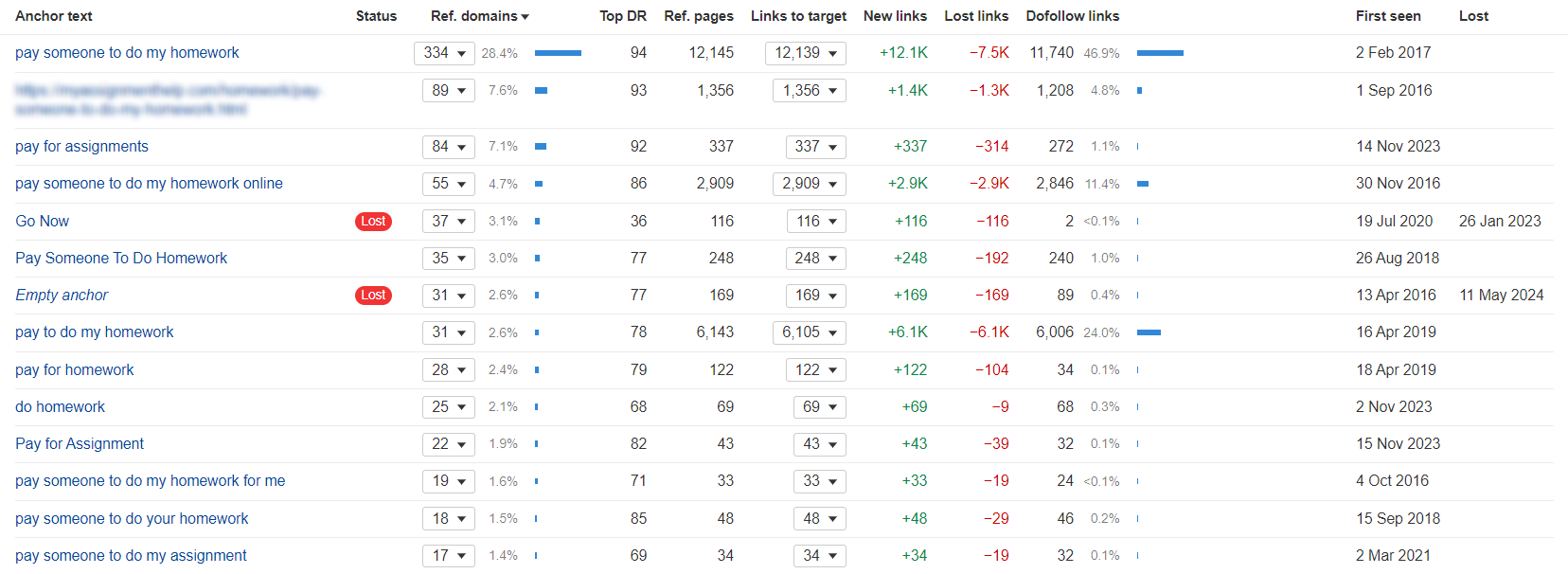
If there are 1000 links pointing to a site and 955 of them have the same anchors, it’s a strong signal to search engines about spam. However, not all repeated anchor texts are a cause for concern. For example, branded anchor texts are often used consistently across different websites and are considered natural.
We strongly advise ensuring the link building prospect doesn’t have anchors related to gray niches if you are targeting a white-hat business. Links from websites with such anchor texts can significantly harm your site’s performance.
The 90-Second Formula in Action
Now, it’s time to put theory into practice. The image below perfectly illustrates the implementation of each step mentioned above. Simply follow these steps, and soon you’ll be able to perform link building prospect evaluation faster than SEO masters. 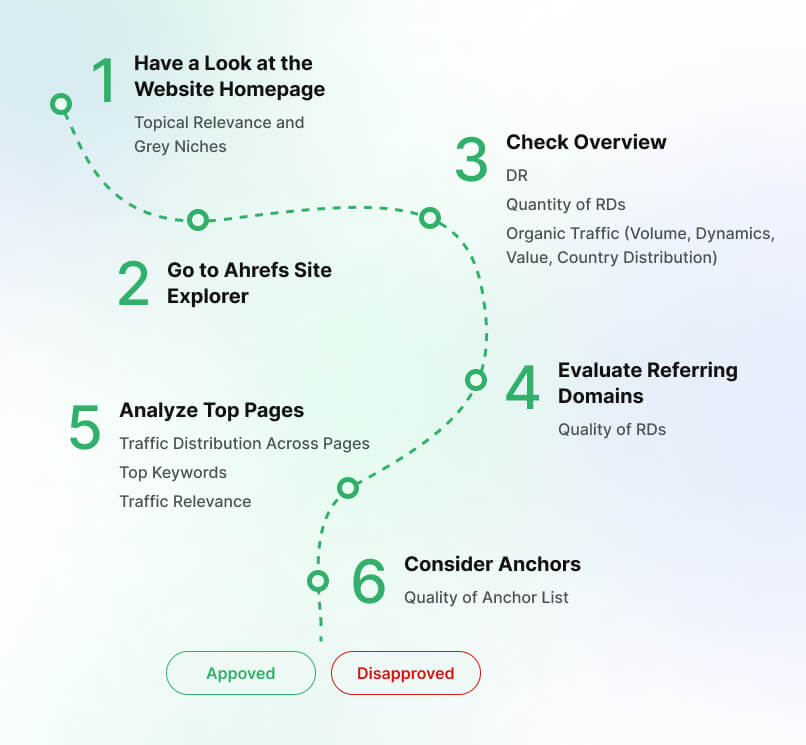
Final Thoughts
Time is money, and when it comes to link building, you should appreciate every second. If you want to reach the top of search results and ensure the stable growth of organic traffic and sales, you should be able to swiftly deal with any challenges. Keeping this in mind, we’ve designed our 90-second formula to help anyone discover the best link building prospects ASAP.
At the same time, you may have some doubts about this or that website during your quick overview. In this case, you may need to conduct a more profound analysis so you can decide whether a backlink from this website will bring value to your business. In this case, it’s better to perform a more comprehensive audit of the mentioned metrics to carefully weigh all the risks and benefits.
Remember that link building is one of the essential elements of SEO strategies. Its efficient implementation may help you establish a popular online brand. On the other hand, if you occasionally get backlinks from low-quality irrelevant domains, Google may apply penalties against your site, lowering its rankings. Thus, always be careful when looking for link building prospects.






